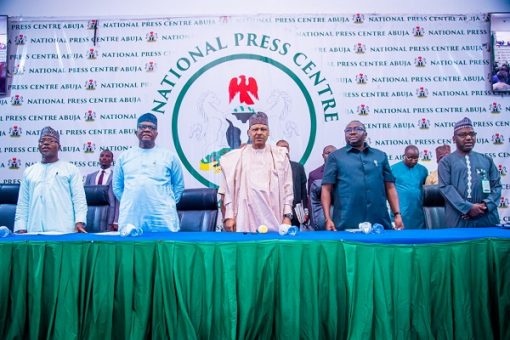FRIDAY April 18, 2025 |
By thenewsdesk.ng
To end the frequent collapse of the national grid, which it described as “old and weak”, the Federal Government has unbundled and offered it for privatisation, TheNATION reports.
Minister of Power Adebayo Adelabu stated this yesterday while reviewing the government’s activities in the electricity sector.
He spoke during his appearance at the 2025 Ministerial Press Briefing Series at the Radio House in Abuja.
The programme was moderated by Minister of Information and National Orientation Mohammed Idris.
Adelabu explained that there is a seven million consumer meter shortfall, which the government is bridging with a planned programme.
He also said no fewer than 80 million Nigerians out of an estimated 240 million population lack access to electricity.
According to him, the government has opened talks with some investors who have indicated interest in the operation of some aspects of the grid before the end of the year.
He said: “We have various offers from private investors. The national grid is owned 100 per cent by the government.
“But, I can tell you, with other ministries competing for funds, we cannot fund the national grid alone.
“It is an expanded national grid. It is too large and there are some dedicated lines in which some private investors have expressed interest.”
Adelabu believes private sector participation in grid management would not be difficult with the operation of the Nigerian Independent System Operator (NISO).
The minister said: “Let them finance construction of new lines, construction of new substations and introduction of new transformers.
“They will be able to benefit from the proceeds of the willing charges from the Distribution Companies (DisCos) and the Generation Companies (GenCos).”
He assured that the government will settle N2 trillion out of the N4 trillion indebtedness to GenCos before the end of the year.
He said he was already discussing with the Minister of Finance and Coordinating Minister of the Economy, Mr. Wale Edun, who has pledged to settle the debt with budgetary allocation and guaranteed instruments.
On how the debt was accumulated, he said the government subsidises 85 per cent of the N170 per kilowatt of electricity consumed by Nigerians on Band B to E.
The minister described half of the N4 trillion as legacy debts from the previous administration.
According to him, the 11 DisCos are not charging cost-reflective tariffs, a development he noted has restricted investment in the sector.
He said the local meter manufacturers lack the capacity for holistic production, other than assembling the parts.
“The rate at which we want to move in meter acquisition and procurement, they don’t have the capacity. What we have, 90 per cent of them are assemblages.
“They assemble completely knock-down parts, CKDs, or semi-knock-down parts, SKDs. They are not full manufacturers. Local content ranges from 10 to 40 per cent. So, we rely more on importation plus local supply.”
Related posts
Categories
- Advertisements (1)
- Agriculture (44)
- Breaking News (26)
- Business (594)
- Crime (976)
- Education (315)
- Entertainment (128)
- Features (13)
- For The Records (43)
- Foreign News (1,181)
- Health (218)
- Home News (332)
- Interview (9)
- Judiciary (347)
- Lifestyle (140)
- Local News (111)
- National News (1,441)
- Opinion (26)
- Politics (992)
- Religion (156)
- Science and Technology (124)
- Security (676)
- Sports (875)
- States' News (807)
- Transportation (325)
- Uncategorized (10)

